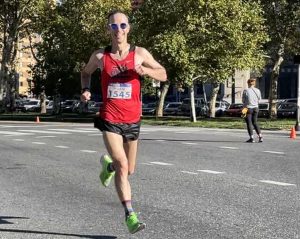 When I was a kid, I spent countless hours swimming. At the township pool. In the lake behind the yellow house we rented each summer in New Hampshire. Or on Long Island Sound, where we’d pack lunches and head to the beach during visits to my grandparents.
When I was a kid, I spent countless hours swimming. At the township pool. In the lake behind the yellow house we rented each summer in New Hampshire. Or on Long Island Sound, where we’d pack lunches and head to the beach during visits to my grandparents.
After tiring of trying to keep myself afloat, I’d inevitably revert to a favorite challenge. Retreating to the shallows, I’d cup my hands together as tightly as possible. Then I’d scoop up some water and see how long I could hold it.
 You know what happened next.
You know what happened next.
It dribbled through the cracks between my fingers. And between that junction where my right hand met my left. After all, these were hands, not buckets or glass jars.
If I wanted to hold water in the palms of my hands, I could never rest easy. I had to keep dipping in for more.
This image recently came to mind. I was jogging. And as I often do on runs, I was thinking about my fitness.
On that particular day, I happened to feel good about where I was. But, I realized, the sensation would always be fleeting.
Health is not like a bank account. Deposits don’t last. It’s really more like (at the risk of introducing a new simile) produce. It only stays fresh for a short time.
Back in my early 30s, I remember reading about a study that predicted health over one’s lifetime. The details have long since escaped me (and I can’t find the study), but I remember being struck by one aspect of it: If I wanted a long, robust life, I had to keep exercising regularly.
At the time, I’d just run a string of races. I was exhausted and looking for a break. And I thought, Wow, no rest for the weary.
Since that time, I’ve done my best to adjust my attitude. Rather than looking at regular exercise as a burden, I’ve tried to view it as a privilege. As in, I’m fortunate that I can do this. And I should focus on enjoying the activity itself, not just its benefits.
I’ve experienced this most profoundly on the heels of injuries. Some – a broken hip, a cracked vertebra – have been potentially life-altering. In their wake, I spent the better part of a year rehabilitating my body, not knowing whether I’d ever be able to run again.
So, when I finally was able to lace up my shoes and take those first tentative steps, I made sure to soak in the moment. And all those that have come after.
 Don’t treat this like a chore, I remind myself. Look at that soft morning light, painting everything the color of a bruised peach. Feel the gentle bite of the north wind as it ushers in autumn.
Don’t treat this like a chore, I remind myself. Look at that soft morning light, painting everything the color of a bruised peach. Feel the gentle bite of the north wind as it ushers in autumn.
Over time, as the pain of those injuries has faded, I’ve thrown myself back into training. If I’m not careful, I’ll get fixated on an upcoming race. Or the fact that my times are not what they were even five years ago.
But then I pull back and remember what it’s all about. The times and races are only short-term goals, ways to keep myself engaged. What matters is the long-term aim: to continue doing this for many, many years.
Tomorrow, I’ll toe the starting line of the Boston Marathon. It will mark the 25th anniversary of my first trek from Hopkinton to Boylston Street. If I’m lucky, I’ll make the same journey another quarter-century from now.
I know that’s a tall order. And I don’t want to wish my life away. So, I’ll just enjoy the day and all that comes with it.
When a kind volunteer hands me a cup of water, I’ll try not to let it fall through my hands. I’ll hold it carefully and drink it all down. And then I’ll keep running as long as I can.
—
Adam Cohen is OMRF’s senior vice president & general counsel and interim president. He can be reached at contact@omrf.org. Get On Your Health delivered to your inbox each Sunday — sign up here.



